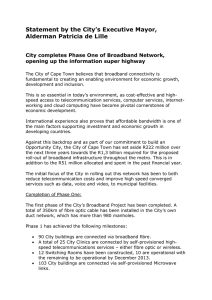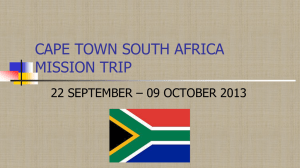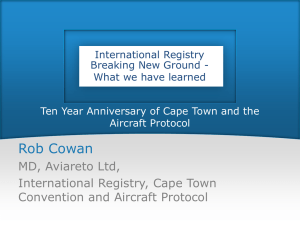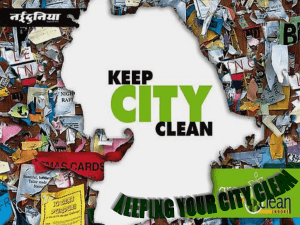City of Cape Town Broadband Project
advertisement
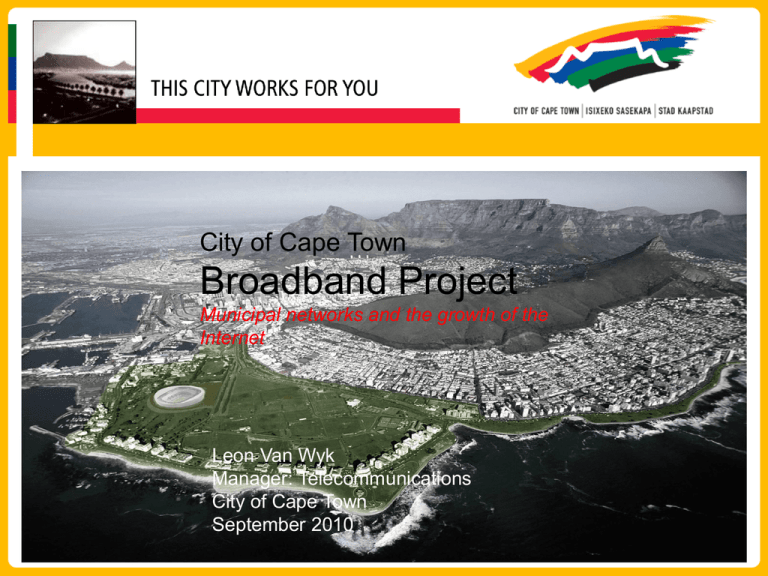
City of Cape Town Broadband Project Municipal networks and the growth of the Internet Leon Van Wyk Manager: Telecommunications City of Cape Town September 2010 What is a municipal network? Telecommunications network built to service a specific city or region Single shared infrastructure capable of supporting multiple networks Usually operated on an ‘open access’ basis Basic infrastructure required to support economic development Affordable bandwidth is frequently cited as one of the main factors supporting investment and economic growth Cape Town Broadband Infrastructure Project What? Municipally owned, open access, optic fibre infrastructure New, purpose built optic fibre and switching centres Phase 1 - R125m capital project (±3% of Cape Town Stadium budget); 500km of fibre Metro area MPLS and VoIP communications network Initially link 60 City buildings with each other and the Internet at 1Gbps (currently averages 0.3Mbps) Dark fibre and Metro Ethernet for third-party use Due for completion December 2010 Cape Town Broadband Infrastructure Project Why? Contain telecommunications costs Currently pay a high cost for very little bandwidth between very few buildings Reduce voice call costs between City buildings Improve the standard of service delivery More bandwidth to more places, allowing greater use of centralised applications and facilities (e.g. SAP ERP, GIS) Encourage local economic development Shared infrastructure for commercial network operators at minimal incremental cost Leverage City’s investment Avoid unnecessary trenching, and provide alternative where no physical space is available Phase 1 Build Phase 1 CBD Build Gallows Hill Switching Center Keller House Switching Center Melkbosstrand Full planned network (phases 1 – 3) Durbanville Cape Town CBD Rosebank Bellville Athlone Newlands Stellenbosch Houtbaai Plumstead Muizenberg Mitchells Plain Khayelitsha Simonstad Strand Cape Town Broadband Infrastructure Project What is being made available? ECS and ECNS license holders can: Rent unlit fibre pairs between switching centres Rent fibre from any fibre distribution point to any nearby building (up to 300m, subject to viability) Connect their own fibre to a switching centre Rent unlit fibre on a cross-connect ring to the exchanges of the national networks Rent rack space in switching centres for transmission equipment Buy 100Mbps or 1Gpbs circuits between switching centres The City is not providing Internet transit or offering services to end users Intent is to support ISPs and telcos, not compete with them Cape Town Broadband Infrastructure Project How will Cape Town benefit? Several independent network operators sharing the same fibre infrastructure More service providers Reduce the capex barrier that limits competition Encourage competition based on services rather than ownership of infrastructure More local bandwidth Lower costs More competitive businesses that will employ more people Cape Town Broadband Infrastructure Project What does it cost? Unlit fibre between switching centres averages R2.40/pair/metre/month Unlit access fibre to buildings will cost up to R70,000 to install (≤300m) and R3.00/pair/metre/month thereafter Rack space Half rack (21U): R4,030/month Full rack (43U): R7,820 (1.5kW) or R10,040 (6kW) Cross-connect rings: R11,400/pair/month, or R22,800/pair/month with full redundancy Ethernet ‘circuits’ between switching centres 100Mbps: ± R61/Mbps e.g. Cape Town – Bellville R7,659 1Gbps: ± R30/Mbps e.g. Cape Town – Bellville R38,295 Cape Town Broadband Infrastructure Project The future One municipal network connecting all buildings and serving all department needs As we connect more City buildings we will lay more fibre throughout Cape Town, including poorly served areas Build more switching centres, to both serve the City’s needs and to stimulate economic development Become a trusted provider of telecommunications infrastructure Cape Town will become one of the most connected cities in Africa Cape Town Broadband Infrastructure Project Leon Van Wyk leon.vanwyk@capetown.gov.za

